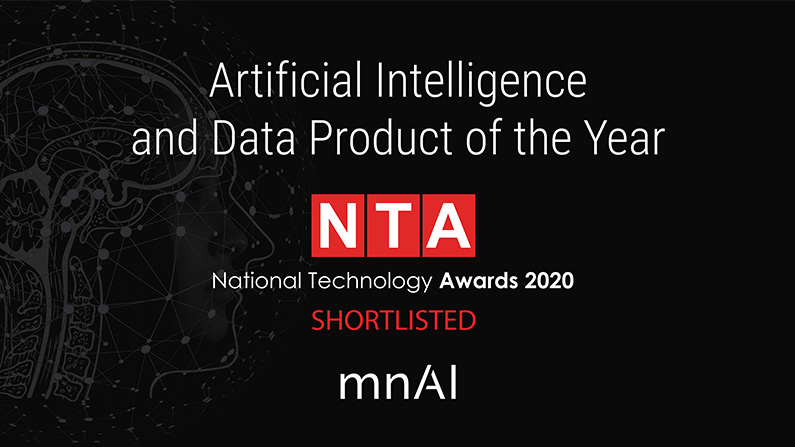National Technology Awards

We’re delighted to announce that mnAI has been shortlisted for the “Artificial Intelligence and Data Product of the Year” at the 2020 National Technology Awards. These highly prestigious awards celebrate the very best of the year’s tech achievements and to be amongst other finalists such as Barclays Payments and Mosaic Smart Data is a huge achievement. Full nominations can be found at: www.nationaltechnologyawards.co.uk/shortlist20.php
Reducing Headaches Across Family Offices

With growing economic and geopolitical tensions impacting global business and creating a degree of uncertainty in the financial markets, family offices are looking to storm-proof their operations for future generations. According to the UBS/Campden Wealth Global Family Office Report 2019, over half (55%) of family offices believe we will enter a recession by the end of 2020. As such, 42 percent are realigning their investment strategies to mitigate risk by preparing to capitalise on opportunistic investments. And they are doing so successfully. Family offices are emerging as the fastest growing body of investors in emerging technologies; the last five years saw a record-breaking $5bn investment into early-stage technology companies. Latest figures look set to surpass this still further in 2020. In fact, 86 percent of respondents in the UBS/Campden report believe that artificial intelligence (AI) will be the next biggest disruptive force across global business; 57 percent feel blockchain technology will also fundamentally change how investments are made and managed. Technology is not just an investment opportunity though. Over a third (37%) believe that ‘virtual family offices’ will outpace the traditional family office structure by 2025. While this may seem surprisingly high, there is already a growing movement towards increasing the degree of operational professionalism across family offices. Half of family office executives are reportedly looking to increase the governance and reporting structures they have in place in the coming years. This speaks to a more deep-routed issue among family offices – the internal process of identifying attractive and previously undiscovered investment opportunities remains a long, drawn-out and arduous one. While we are seeing a trend towards moving away from primarily working with investment banks in favour of leveraging families’ personal networks, the due diligence required before proceeding with any investment remains significant – both in terms of cost and time. There are a multitude of risk factors that need to be considered; from Know Your Customer (KYC) and Anti-Money Laundering (AML) checks on all involved parties to post-investment operational processes, data retention and control, as well as compliance and regulatory management and alignment. Not to mention external risk factors such as Directors, regulatory changes and cyber-attacks. There’s no way offinding out everything people know or what they will do with their knowledge about target companies once they leave the business. All of this amounts to an ever-present operational headache for family offices which are, and always have been,modestly staffed. While the vast majority do segregate duties to mitigate potentially conflicting tasks, the relatively small size of operations often dictates that this is overlooked. Added to this is the fact that essential due diligence is done, for the most part, manually. Working on pure economies of scale, simply by freeing up a fraction of the time and resource currently dedicated to undertaking due diligence, family offices would be able to identify and investigate significantly more potential investment opportunities. The question then, is how? The answer lies in taking a leaf out of the emerging technology companies’ books that family offices have already started investing in. As mentioned, nearly all family office executives believe AI is set to fundamentally disrupt global business.It’s unsurprising then that it will disrupt their own. By harnessing a data-driven approach and leveraging AI algorithms, family offices will be able to rapidly scale due diligence processes while boosting productivity and reducing costs. Take the gathering of crucial information such as balance sheets, P&L, debtor versus cash positions and growth and decline rates to create a picture of a company’s financial health. At present, this manual process takes hundreds of hours, relying on executives to trawl through Company House and the wider internet to find the correct, relevant information. Once collated, it then has to beanalysed, again manually, and checked multiple times to ensure the insights gained are both correct and of use. This process, from start to finish, easily takes months. Harnessing AI algorithms that automate the gathering of this information by scouring the internet for the relevant information, completely removes the arduous legwork involved – reducing the time it takes to identify and understand relevant businesses from months to minutes. An intelligent data-driven process is the pill family offices need to overcome their operational headaches. Not only will harnessing AI enable family offices to scale their operations at pace, the time and insights returned to executives will allow for a sharpening of strategic focus to ensure they weather any storm. www.globalbankingandfinance.com/how-to-reduce-operational-headaches-across-family-offices/
UK Deal Flow Software Launches

Artificial intelligence (AI) powered deal flow platform mnAI has the UK with investment and acquisition markets in its sights. According to the firm it has over 350 search parameters, so subscribers can use its proprietary technology to find online reputational, financial and combined credit scores. John Cushing, mnAI’s CEO and Co-Founder, says: “From first-hand experience, I know how painful and time consuming it can be to identify companies for investment and acquisition. With mnAI we have created a technology platform that empowers decision making. We’ve ripped up the rule book, streamlining the entire process for identifying and understanding a target business from months to minutes.” Keen to back its ambitions up more with stats, mnAI explains that it uses over 55 million financial records of UK companies from the last ten-year period. It uses a combination of Bayesian mathematics (i.e. applying probabilities to statistical problems) and random forest modelling (a learning method for classification) to power predictive algorithms that allow users to determine future-based EBITDA and discounted cash flow (DCF) valuations. mnAI uses a natural language keyword search engine as it views Standard Industry Classification (SIC) codes as “guess work”. In practice, this means users can search for exact keywords or phrases associated with the sector they’re looking into. The stats aren’t over. The firm’s platform autonomously tracks 37.1 million director, shareholder, officer and persons with significant control (PSC) profiles in real time. These visual charts also track balance sheets, profit and loss, creditors, debtors, debt, shareholders, connections, contacts and introductions. In terms of personnel profiles, Cushing has plenty of experience. For example, he is also an advisor for Silicon Valley Bank and worked as a mentor for TechStars. The other co-founder is Andrew King, mnAI’s CTO. His experience includes UK human resource management and payroll services firm Ceridian. Despite being a new face, mnAI already has some case studies on its website. These include Wharton School of Business and Nickleby Capital. www.fintechdirect.net/2020/01/16/uk-deal-flow-engine-wants-to-be-mnai-attraction/